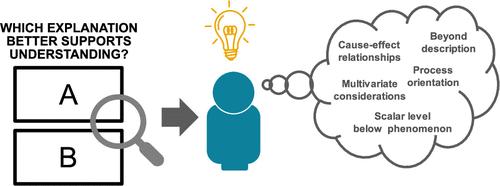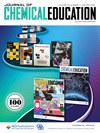告诉我为什么?提高学生教师对有机化学中详细机理解释的认识
IF 2.9
3区 教育学
Q2 CHEMISTRY, MULTIDISCIPLINARY
引用次数: 0
摘要
解释是教师支持学生对化学现象进行有意义学习的核心能力。在《有机化学》中,这包括通过将结构、电子和能量因素联系起来,理解反应的过程和原因。然而,研究表明,教师的讲解并不会自动包括这些重要的机理方面。在有机化学课程中,如果教师的讲解不够深入,就会暗中向学生传达一种信息,即含糊的讲解就足够了,而学生教师可能会将这种信息转移到他们今后在高中的日常化学教学中。为了帮助学生教师认识到《有机化学》课程中精细解释的关键特征,我们开发了一个嵌入学生教师课程的活动。通过有目的地选择对比性解释,学生教师在批判性地检查同伴对不同反应的解释之前,归纳发现了支持对基本反应理解的机理解释的标准。对该活动的定性评价显示,学生教师(9 人)的解释变得更加复杂,他们对什么是详细解释的看法也发生了变化。本文章由计算机程序翻译,如有差异,请以英文原文为准。

Tell Me Why: Raising Student Teachers’ Awareness for Elaborate Mechanistic Explanations in Organic Chemistry
Explaining is a core competence of teachers to support students’ meaningful learning of chemical phenomena. In Organic Chemistry, this involves understanding the processes and reasons underlying reactions by linking structural, electronic, and energetic considerations. However, research has shown that teacher explanations do not automatically include these important mechanistic aspects. Less sophisticated explanations in Organic Chemistry courses can implicitly convey to learners that vague explanations are sufficient, which student teachers might transfer to their future everyday chemistry teaching at high schools. To support student teachers’ awareness of key characteristics underlying elaborate explanations in Organic Chemistry, we developed an activity embedded in a student teacher course. By using purposefully chosen contrasting explanations, the student teachers inductively discovered criteria for mechanistic explanations that supported an understanding of the underlying reactions before critically examining their peers’ explanations of different reactions. The qualitative evaluation of the activity revealed that student teachers’ (N = 9) explanations became more sophisticated and that their perception of what constitutes an elaborate explanation changed.
求助全文
通过发布文献求助,成功后即可免费获取论文全文。
去求助
来源期刊

Journal of Chemical Education
化学-化学综合
CiteScore
5.60
自引率
50.00%
发文量
465
审稿时长
6.5 months
期刊介绍:
The Journal of Chemical Education is the official journal of the Division of Chemical Education of the American Chemical Society, co-published with the American Chemical Society Publications Division. Launched in 1924, the Journal of Chemical Education is the world’s premier chemical education journal. The Journal publishes peer-reviewed articles and related information as a resource to those in the field of chemical education and to those institutions that serve them. JCE typically addresses chemical content, activities, laboratory experiments, instructional methods, and pedagogies. The Journal serves as a means of communication among people across the world who are interested in the teaching and learning of chemistry. This includes instructors of chemistry from middle school through graduate school, professional staff who support these teaching activities, as well as some scientists in commerce, industry, and government.
 求助内容:
求助内容: 应助结果提醒方式:
应助结果提醒方式:


